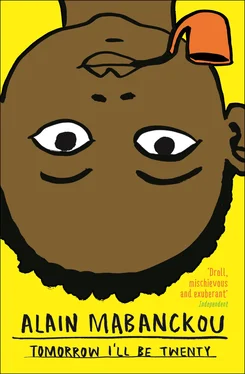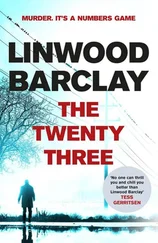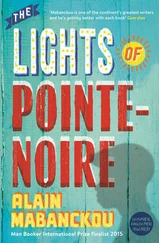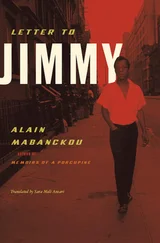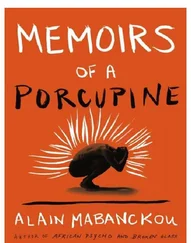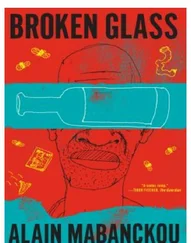‘And what if I die before you?’
‘There’s your son, Michel. He’ll get everything!’
‘Michel isn’t our mother’s son, he’s my son! And don’t forget, there are other people in the family too!’
Then I hear the names of my aunts and uncles, who I haven’t met yet: Aunt Bouanga, who lives in Dolisie, over two hundred kilometres from Pointe-Noire. Aunt Dorothée, who’s married and lives in the village of Moussanda. Uncle Joseph who lives in Louboulou and is the youngest in the family, just after my mother. They’re just names to me. I haven’t met them yet. Maman Pauline often tells me they’re all very nice, that they think of me, and would like to see me too, one day.
Uncle René acts like he’s the big brother in this family, when in fact Aunt Bouanga and Aunt Dorothée are older than him. These two aunts are afraid of him, they can’t stand up to him and he’s just waiting for the day someone in the family dies so he can dash to the wake and announce, ‘Everything belonging to the deceased is mine.’ And if Maman Pauline dies, will he come and take our house and throw me out like he threw out Uncle Albert’s children? I can’t believe he will because this house was bought for us by Papa Roger and my name is on the papers. How could Uncle René come and take it? Papa Roger would wage a world war on him first, because usually the inheritance should go to the children. I try to understand why Uncle René acts the way he does, and I tell myself, ‘Perhaps if you’re rich in this life, you always want to get richer, and you stop noticing that the people around you have nothing.’
Before he left, my uncle threw a 100 °CFA franc note on the ground. My mother refused to take it. As soon as his car had started up, I quickly picked up the note, before the wind blew it away and into the middle of the street in the Avenue of Independence and everyone started fighting for it and saying it was theirs and we’d have no proof it belonged to us.
Lounès has been to the Rex with his father to see Mandala, daughter of India . They said people were weeping in the cinema, including Monsieur Mutombo, and it’s not every day you see him cry.
While we’re walking over to the football pitch in Savon, for a match between the Tié-Tié Caids and the Voungou Dragons, Lounès tries to explain the film to me. He tells me about a prince called Samsher and his sister, princess Rajshree, who live a life of such luxury that compared to them even capitalists look like paupers. They have elephants, tigers, lions, a beautiful palace in all the colours of the rainbow, rivers full of flowers and beautiful women, bathing and dancing, swaying their Netherlands. I listen to him, envy him, I feel jealous of him. But I do rather wonder if Lounès isn’t adding a bit of spice to his story, to get me to ask Papa Roger to take us to see it, because children aren’t allowed to go to the cinema on their own.
He describes how the prince and princess are cruel to the villagers. They’re like the capitalists are towards the Wretched of the Earth. And yet they’re rich, the princess and prince, why can’t they leave the poor people in peace? Fortunately there’s a young man called Jai who decides to fight back. It’s not easy for him to attack an entire kingdom. He’s a very courageous young man, besides which, he wants princess Rajshree to be his wife, which is no easy fix. The princess is too proud and she refuses to listen to all Jai’s fine words, though they’re sweet as honey. Thank God there’s a country girl who loves Jai and sacrifices herself to save him from death. This is the point where the people all clapped in the cinema and Jai gets his own back and shows that just because you’re rich doesn’t mean you can mess the poor people around.
When I hear Lounès telling the story, I feel as though he’s actually been to India and visited the palace he’s describing in such detail. Then it occurs to me that it’s a bit like what’s happened to me with Caroline, now she loves Mabélé, when she should love me. Because I’ve got lots of plastic lorries and spades and rakes, I’m a bit like the peasant boy in Mandala, daughter of India . I should go and chat up princess Caroline but I don’t want some peasant girl loving me and sacrificing herself for me and saving me from death. Mabélé is very proud, and thinks he’s the only one who reads the work of Marcel Pagnol, and can write poems for Caroline.
‘Michel, you’re talking to yourself!’
I hadn’t even noticed I was speaking out loud.
‘I don’t like Mabélé, you know,’ he says.
‘D’you know him then?’
‘No, but I often see him in the street with the boys from over on Block 55.’
‘I want to see him too, I want to know if I’m better looking than him…’
‘You are better looking than him, I’ve already told you.’
‘Really?’
‘Anyway, you’ll see him later, for real.’
‘Where?’
‘On the pitch.’
‘What? On the pitch?’
‘He’s the number 11 for the Tié-Tié Caids.’
‘But Jonas, the one they call Little Pelé, always plays number 11.’
‘Jonas is out, he got dropped for being rude to the coach. He plays for the Voungou Dragons now.’
‘You mean, Little Pelé’s going to be playing against his own old team?’
‘He’ll be playing against our Tié-Tié Caids.’
Lounès and I have always supported the Tié-Tié Caids because we like the way Jonas dribbles from the halfway line to right in front of the other team’s goalkeeper. That’s how he got the nickname Little Pelé. There’s no stopping him when he’s got the ball at his feet. He flies through the air, taking off like a rocket, and when he kicks the ball with his left foot you know for sure it’s going to hit the back of the net. The other teams often said: to win the match, someone has to break Jonas’s leg. So they’d stick a really tall, muscular defender on him, someone who looks like they must be twenty already, though in fact all the players are about Lounès’s age, never older.
I say to Lounès, ‘If Jonas isn’t playing for the Tié-Tié Caids and Mabélé’s playing instead, I’m not going to support the Tié-Tié Caids, I’m supporting the Voungou Dragons and I want them to win this match!’
Now we’re at the Tata-Luboka pitch, Lounès points out Mabélé from a distance.
‘Look, he’s over there. He’s the one doing up his bootlaces near the goalkeeper.’
The stadium’s already full. People are standing all round the pitch, which is full of holes. The smallest bring their own stools and climb up on them, otherwise they wouldn’t see anything.
While I’m still looking at Mabélé and thinking there’s nothing he’s got that I haven’t, Lounès whispers in my ear, ‘Look who’s just opposite.’
‘Caroline?’
‘Shush! Don’t look that way, she’s looking at us.’
Caroline’s wearing an orange jersey, the colour of the Tié-Tié Caids. So she’s come to support Mabélé.
‘You told me she was gong to your aunt’s, and…’
‘Yeah, she’s still staying there. Maybe Mabélé invited her.’
‘I’m going home, I don’t want to see this match any more!’
‘No, stay, I’ll take care of Mabélé, just watch what I do in front of everyone. Maître John’s already taught me some advanced katas you only learn when you’ve got your orange belt. Just you wait!’
‘No, I’m going.’
He holds me back by my shirt. I struggle, manage to break loose, but I hear my shirt rip.
I’m already two hundred metres away from Lounès and I’m running like a bullet. People yell after me when I push past them. I don’t care, I just keep on running.
Читать дальше
